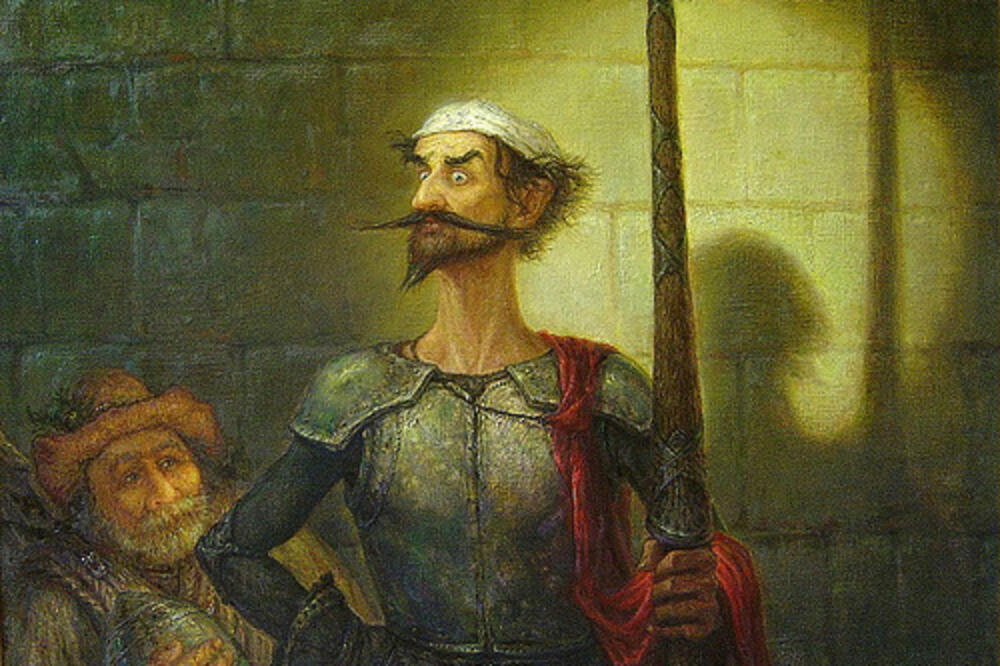In a few days, readers will receive the third volume of the first modern and greatest novel ever written - Cervantes' Don Quixote. The new edition of "Vijesti" began in the best possible way - with a novel that succeeded in something that few books can boast of - to capture the spirit of the epoch, to preserve for all time all the key features of a time.
At the same time, and even more importantly – psychological bravura unmatched in world literature. The first European, the first modern man. Trapped between illusions and reality, between the forest of text and the desert of reality. We're all Don Quixote sometimes, but we rarely dare to charge at windmills...
Imagine that the sad-faced knight from La Mancha, on his endless timeless wanderings (isn't that what great literature is always about), wanders into our time and into today's Montenegro. At least as a tribute to that beautiful myth about his captivity in Ulcinj.
It is clear that his faithful companion Sancho Panza would have done better in everything - that was mostly the case in Spain, then. (After all, even in Cervantes, Sancho Panza occasionally looks like a reliable member of the DPS.)
But, still... Don Quixote would easily choose a side in any situation. Real knights usually manage to do that. Imagine - the two of them, a knight on a horse and a squire on a mule, come across people who are building a road. And in doing so, they arrest a man every day whose piece of property will be eaten by the new imperial road (that's what it was called then, I guess), but the imperial treasurers have no intention of paying, or at least not immediately.
Don Quixote, as a pure soul, easily understands what it is about - force and violence are not difficult to recognize. He would, of course, first talk to the workers, ask them to take him to the chief magnate to try to reason with him in a chivalrous and gentlemanly manner. But if he met the duke of Podgorica and the baron of Mareza - I believe that even he would quickly lose his patience. He would understand that this great man and justice can never be on the same side.
His long, Elgrek face doesn't go well with a slap, which doesn't mean he wouldn't get one. Big men are timid and lazy, both then and now. His first windmill in Montenegro... (Provided that thieves haven't dismantled and blown it up a long time ago.)
Or, if the road took him to a session of the Council of the Faculty of Law. While the dean performs one of his performances under the joint title "No one can do anything to me, I am stronger than fate... And not only than fate". I think that everything would be clear to him, but that he would definitely leave the dean - to Sancho Pansa.
Not every windmill is worthy of the last knight. Sancho might be able to explain to his knight what it was all about. This is where this legendary duo would slowly begin to understand today's Montenegro. Here, every institution, every area got a person in charge of carrying out violence on behalf of the ruling elite.
The term "mafia methods" was not used then, but Don Quixote would have understood, sooner or later, what it was all about. And while the dean, with a soundscape of hysterical laughter, is leaving the session, Don Quixote would surely block his way and challenge him to a duel.
With Sancho Panza, of course. The dean would look at him disdainfully and explain to him that "there is no quorum" for a duel. He would also accuse him of working for the opposition and against the government. Don Quixote would certainly not contradict himself, he knows that all real characters, since the beginning of literature, work against the government, and he could not even perceive it as an insult. Only Jago, and a few others like him, worked for the government. In great literature, even a prince works against the government - let's remember the Danish prince Hamlet and his troubles.
After this short discussion about literature and government, the dean would accuse Don Quixote of actually working for the "bloodthirsty media", which, in today's Montenegro, is an even more serious accusation than working for the opposition. It would not be easy for a man brought up on the etiquette of chivalric novels to understand such undisguised rampage and arrogance.
In fact - a mockery of reason and morality. Maybe he would be surprised how it is that some knight-avenger hasn't wandered this country for a long time? There is so much injustice here at every turn, and knights from nowhere? It would not be easy for him to understand. For us, today, it is not a problem: everything has been clear to us for a long time.
That's how Don Quixote would remember Montenegro: a country with so many windmills, and nowhere fresh air...
Bonus video:





